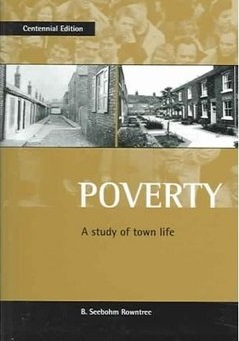
Tobacco smoking is the practice of burning tobacco and ingesting the resulting smoke. The smoke may be inhaled, as is done with cigarettes, or simply released from the mouth, as is generally done with pipes and cigars. The practice is believed to have begun as early as 5000–3000 BC in Mesoamerica and South America. Tobacco was introduced to Eurasia in the late 17th century by European colonists, where it followed common trade routes. The practice encountered criticism from its first import into the Western world onwards but embedded itself in certain strata of a number of societies before becoming widespread upon the introduction of automated cigarette-rolling apparatus.

The poverty threshold, poverty limit, poverty line, or breadline is the minimum level of income deemed adequate in a particular country. The poverty line is usually calculated by estimating the total cost of one year's worth of necessities for the average adult. The cost of housing, such as the rent for an apartment, usually makes up the largest proportion of this estimate, so economists track the real estate market and other housing cost indicators as a major influence on the poverty line. Individual factors are often used to account for various circumstances, such as whether one is a parent, elderly, a child, married, etc. The poverty threshold may be adjusted annually. In practice, like the definition of poverty, the official or common understanding of the poverty line is significantly higher in developed countries than in developing countries.
A regressive tax is a tax imposed in such a manner that the tax rate decreases as the amount subject to taxation increases. "Regressive" describes a distribution effect on income or expenditure, referring to the way the rate progresses from high to low, so that the average tax rate exceeds the marginal tax rate.
A sin tax is an excise tax specifically levied on certain goods deemed harmful to society and individuals, such as alcohol, tobacco, drugs, candies, soft drinks, fast foods, coffee, sugar, gambling, and pornography. In contrast to Pigovian taxes, which are to pay for the damage to society caused by these goods, sin taxes are used to increase the price in an effort to lower demand, or failing that, to increase and find new sources of revenue. Increasing a sin tax is often more popular than increasing other taxes. However, these taxes have often been criticized for burdening the poor and disproportionately taxing the physically and mentally dependent.

Benjamin Seebohm Rowntree, CH was an English sociological researcher, social reformer and industrialist. He is known in particular for his three studies of poverty in York, conducted in 1899, 1935, and 1951.
In a tax system, the tax rate is the ratio at which a business or person is taxed. The tax rate that is applied to an individual's or corporation's income is determined by tax laws of the country and can be influenced by many factors such as income level, type of income, and so on. There are several methods used to present a tax rate: statutory, average, marginal, flat, and effective. These rates can also be presented using different definitions applied to a tax base: inclusive and exclusive.

Allen John Carr was a British author of books about stopping smoking and other psychological dependencies including alcohol addiction.
The Joseph Rowntree Foundation (JRF) is a charity that conducts and funds research aimed at solving poverty in the UK. JRF's stated aim is to "inspire action and change that will create a prosperous UK without poverty."

Charles James Booth was a British shipowner, Comtean positivist, social researcher, and reformer, best known for his innovative philanthropic studies on working-class life in London towards the end of the 19th century.

Nicotine marketing is the marketing of nicotine-containing products or use. Traditionally, the tobacco industry markets cigarette smoking, but it is increasingly marketing other products, such as electronic cigarettes and heated tobacco products. Products are marketed through social media, stealth marketing, mass media, and sponsorship. Expenditures on nicotine marketing are in the tens of billions a year; in the US alone, spending was over US$1 million per hour in 2016; in 2003, per-capita marketing spending was $290 per adult smoker, or $45 per inhabitant. Nicotine marketing is increasingly regulated; some forms of nicotine advertising are banned in many countries. The World Health Organization recommends a complete tobacco advertising ban.

The Minnesota State Lottery, or Minnesota Lottery, is a government agency that operates lotteries in the U.S. state of Minnesota. The state’s lottery system was established in 1988 through a successful voter referendum that amended the state’s constitution. Lottery revenue is paid out towards prizes, administrative expenses, and retailers, and the remaining proceeds are split between environmental conservation funds and the state's general fund. The Minnesota Lottery participates in the Multi-State Lottery Association and several other multi-jurisdiction games. In-house draws include Pick 3, Gopher 5, and North 5, among many other games and offerings.

Poverty in the United Kingdom is the condition experienced by the portion of the population of the United Kingdom that lacks adequate financial resources for a certain standard of living, as defined under the various measures of poverty.

Poverty, A Study of Town Life is the first book by Seebohm Rowntree, a sociological researcher, social reformer and industrialist, published in 1901. The study, widely considered a seminal work of sociology, details Rowntree's investigation of poverty in York, England and the subsequent implications that arise from the findings, in regard to the nature of poverty at the start of the 20th century. It also marks the first usage of a poverty line in sociological research.

Smoking is a practice in which a substance is combusted and the resulting smoke is typically inhaled to be tasted and absorbed into the bloodstream of a person. Most commonly, the substance used is the dried leaves of the tobacco plant, which have been rolled with a small rectangle of paper into an elongated cylinder called a cigarette. Other forms of smoking include the use of a smoking pipe or a bong.

An association between tobacco and other drug use has been well established. The nature of this association remains unclear. The two main theories, which are not mutually exclusive, are the phenotypic causation (gateway) model and the correlated liabilities model. The causation model argues that smoking is a primary influence on future drug use, while the correlated liabilities model argues that smoking and other drug use are predicated on genetic or environmental factors.

Health in Switzerland relates to a variety of issues. Namely, water and sanitation, diet and fitness, various addictions, mental fitness, communicable diseases, hygiene and the environment.
Fiscal policy are "measures employed by governments to stabilize the economy, specifically by manipulating the levels and allocations of taxes and government expenditures". In the Philippines, this is characterized by continuous and increasing levels of debt and budget deficits, though there were improvements in the last few years of the first decade of the 21st century.

Poverty in New Zealand deals with the incidence of relative poverty in New Zealand and its measurement. Between 1982 and 2011, New Zealand's gross domestic product grew by 35%. Almost half of that increase went to a small group who were already the richest in the country. During this period, the average income of the top 10% of earners in New Zealand almost doubled going from $56,300 to $100,200. The average income of the poorest tenth increased by only 13% from $9700 to $11,000. Figures from 2016 show that about 15% of the population lives in poverty, compared to 9% in the 1980s, and 22% in 2004.

Social class in Luxembourg after 1945 is generally based on occupation, personal income, and spending power as well as rights to social welfare rather than birth circumstances and family background. The country's demographic situation has changed considerably since 1945, where a mostly blue-collar working population gave way to mostly white-collar occupations over the second half of the twentieth century. Differences in consumer patterns between the white-collar and blue-collar workers decreased considerably between 1963 and 1977, causing a socio-economic evolution that saw a wider sphere of access for both working and middle classes to consumer goods such as cars, white goods, and real estate, thus demonstrating an equalisation of social strata in terms of income and spending power. The population of Luxembourg has also altered in nature due to significant growth in numbers of residents and increases in migration patterns since the mid-twentieth century; in 1961 13% of the population consisted of non-Luxembourgers, by 2020, this is at 44.3. At present, 47% of the Luxembourgish population has a migrant background’, and this is as a result of the response to socioeconomic processes that drew large numbers of immigrants to the country in the latter half of the twentieth century.












